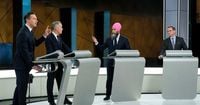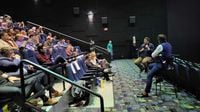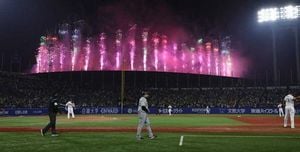On Thursday night, April 17, 2025, the Scotiabank Theatre in downtown Toronto buzzed with energy as The Hub hosted a watch party for the highly anticipated English-language leaders’ debate. This event brought together political enthusiasts, analysts, and community members eager to dissect the performances of the candidates vying for leadership in the upcoming election.
Co-founders of The Hub, Rudyard Griffiths and Sean Speer, led the discussion, providing insightful commentary on how the debate performances could influence the electoral outcome. Their analysis was met with enthusiasm from the audience, who participated in a lively Q&A session that followed the debate.
Political analyst Mike Lecouteur, reflecting on the debate, noted that while the leaders had their moments, they all managed to land 'a few punches' during their exchanges. This indicates a competitive atmosphere, with candidates not shying away from confronting each other on key issues.
As the election approaches, debates like this one become crucial for candidates to solidify their positions and connect with voters. The Hub's watch party not only provided a platform for community engagement but also highlighted the importance of such events in the democratic process. Griffiths and Speer emphasized that debates are not just about rhetoric; they are pivotal moments that can sway public opinion and ultimately determine the election's outcome.
The atmosphere at the watch party was electric, with attendees reacting in real-time to the candidates' performances. The collective energy of the crowd underscored the significance of the debate as a focal point in the election cycle. Griffiths remarked, "It's vital for voters to see these leaders in action, to understand their policies and personalities beyond the soundbites. This debate was a crucial opportunity for them to do just that."
As discussions continued, it became clear that the debate's impact would resonate beyond the night. Voters are increasingly looking for authenticity and clarity from their leaders, and events like these allow them to gauge candidates' abilities to articulate their visions for the future.
In the wake of the debate, analysts like Lecouteur will be watching closely to see how the candidates capitalize on their performances. The stakes are high, and every moment counts as the election date draws nearer. With public sentiment shifting rapidly, the ability of each leader to connect with voters on a personal level could prove decisive.
The Hub's commitment to fostering political discourse is evident in their efforts to create spaces where community members can engage with the political process. By hosting events like the watch party, they contribute to a more informed electorate, encouraging citizens to take an active role in shaping their democracy.
As the debate unfolded, key issues emerged, including healthcare, climate change, and economic recovery, each leader presenting their vision for addressing these pressing challenges. The audience's reactions varied, showcasing the diverse perspectives within the community.
Griffiths noted the importance of these discussions, stating, "We need to ensure that all voices are heard, and that includes those who may not feel represented in traditional political discourse. Our goal is to bridge that gap and create an inclusive space for dialogue."
With the election looming, the debate served as a critical juncture for candidates to refine their messages and resonate with undecided voters. The Hub's watch party exemplified how grassroots engagement can shape the political landscape, emphasizing the role of informed citizens in a healthy democracy.
As the night concluded, attendees left the theatre with a renewed sense of purpose, armed with insights from the debate and a commitment to participate in the electoral process. The Hub's initiative to host such events reflects a broader trend of increasing civic engagement, as citizens recognize the power of their votes in shaping the future.
In summary, the watch party at The Hub not only provided a platform for discussion and analysis but also highlighted the importance of community involvement in the political process. As the election approaches, the performances from the leaders’ debate will undoubtedly play a significant role in influencing voter decisions, making events like this more crucial than ever.






